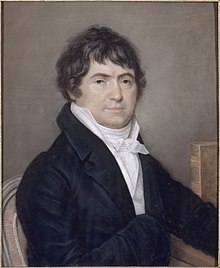Pierre Laromiguière
Pierre Laromiguière (born November 3, 1756 in Livignac , France , † August 12, 1837 in Paris ) was a French philosopher .
Life
As a professor of philosophy at the University of Toulouse , he was unsuccessful and attracted Parliament's disapproval because of his theses on the protection of private property and its taxation. He later came to Paris, where he became professor of logic at the École normal supérieure and gave lectures at the Prytanée . In 1799 he became a member of the Tribunate and in 1833 of the Académie des sciences morales et politiques . In 1793 he published "Projet d'élements de métaphysique", a work that is characterized by its clarity and its special style. Even before his academic career he wrote two treatises: "Les Paradoxes de Condillac" (1805) and "Le cours de philosophie" (1815-1818).
Laromiguière's philosophy is a revolt against the physiological psychology of natural scientists advocated by Cabanis and others . He made a distinction between such physiological phenomena, which can be traced back to purely physical causes , and the expressions of the soul which have their origin in itself. For him, psychology was neither a branch of physiology, nor did it require an absurd metaphysical basis. As a pupil of Étienne Bonnot de Condillac and ideologically indebted to Destutt de Tracy in many ways , attention as a psychological faculty was of great importance to him. Attention provides the facts, comparison groups and combines them, while the mind systematizes and explains. The soul makes an active choice, i. that is, it is endowed with free will and is therefore immortal.
He had no respect for science as a research method. He said that their judgments were at best assertions of identity and that their so-called discoveries were merely repetitions of truisms in a new form. Laromiguière was not the first to take this view; he paid tribute to Condillac, Destutt de Tracy, and Cabanis. The accuracy of his language and the purity of his style gave his work great influence, particularly through Armand Marrast , Louis Cardaillac and Victor Cousin . One of his lectures at the “École Normale” impressed Cousin so much that he immediately devoted himself to studying philosophy. Jouffroy and Hippolyte Taine called him one of the great thinkers of the 19th century.
| personal data | |
|---|---|
| SURNAME | Laromiguière, Pierre |
| BRIEF DESCRIPTION | French philosopher |
| DATE OF BIRTH | November 3, 1756 |
| PLACE OF BIRTH | Livignac |
| DATE OF DEATH | August 12, 1837 |
| Place of death | Paris |
